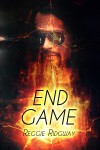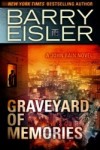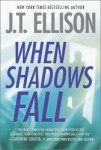

February 24 – March 2: “How do news events shape your plots?”
 This week join ITW Members Stephen Carbone, Lisa Von Biela, Daniel Suarez, Barry Eisler, Reggie Ridgway, William Lashner and J.T. Ellison as they discuss how news events shape their plots and answer the question that everyone is wondering: “How closely should thriller writers follow the news?”
This week join ITW Members Stephen Carbone, Lisa Von Biela, Daniel Suarez, Barry Eisler, Reggie Ridgway, William Lashner and J.T. Ellison as they discuss how news events shape their plots and answer the question that everyone is wondering: “How closely should thriller writers follow the news?”
~~~~~
 Lisa von Biela worked in Information Technology for 25 years, then left the field to attend the University of Minnesota Law School, graduating magna cum laude in 2009. She now practices law in Seattle, Washington. Lisa’s first short story appeared in The Edge in 2002. Her short works have appeared in various small press venues, including Gothic.net, Twilight Times, Dark Animus, AfterburnSF, and more. Her debut novel, THE GENESIS CODE, was released in 2013. Her second novel, THE JANUS LEGACY, is due out in February 2014, and her first novella, ASH AND BONE, is set for release in May 2014.
Lisa von Biela worked in Information Technology for 25 years, then left the field to attend the University of Minnesota Law School, graduating magna cum laude in 2009. She now practices law in Seattle, Washington. Lisa’s first short story appeared in The Edge in 2002. Her short works have appeared in various small press venues, including Gothic.net, Twilight Times, Dark Animus, AfterburnSF, and more. Her debut novel, THE GENESIS CODE, was released in 2013. Her second novel, THE JANUS LEGACY, is due out in February 2014, and her first novella, ASH AND BONE, is set for release in May 2014.
 Reggie Ridgway is a full time writer and author of three recently published thrillers which have garnered a number of great reviews. In The Midnight Hour was published by Echelon Press in 2012 and Moon Shadow and Endgame published recently by Bookrix. From Reggie: I have many free short stories and flash fiction offerings free on my blog. I was a finalist in the Amazon Breakthrough Author contest. I am a member of International Thriller Writers. I earned a BA from National University Vista in Computer Science. I am a Viet Nam War veteran and retired after forty years working in the medical field as an x-ray technologist. I am currently a full time novelist. And I also act in hollywood and have appeared in TV episodes, like Dexter and The Office.
Reggie Ridgway is a full time writer and author of three recently published thrillers which have garnered a number of great reviews. In The Midnight Hour was published by Echelon Press in 2012 and Moon Shadow and Endgame published recently by Bookrix. From Reggie: I have many free short stories and flash fiction offerings free on my blog. I was a finalist in the Amazon Breakthrough Author contest. I am a member of International Thriller Writers. I earned a BA from National University Vista in Computer Science. I am a Viet Nam War veteran and retired after forty years working in the medical field as an x-ray technologist. I am currently a full time novelist. And I also act in hollywood and have appeared in TV episodes, like Dexter and The Office.
 Daniel Suarez is a New York Times bestselling author and former systems consultant to Fortune 1000 companies. His books include Daemon, Freedom™, Kill Decision, and Influx – works that were informed by his nearly two decade career developing software for the defense, finance, and entertainment industries. With a lifelong interest in both IT systems and creative writing, Daniel’s high-tech and Sci-Fi thrillers focus on technology-driven change.
Daniel Suarez is a New York Times bestselling author and former systems consultant to Fortune 1000 companies. His books include Daemon, Freedom™, Kill Decision, and Influx – works that were informed by his nearly two decade career developing software for the defense, finance, and entertainment industries. With a lifelong interest in both IT systems and creative writing, Daniel’s high-tech and Sci-Fi thrillers focus on technology-driven change.
Stephen Carbone is new to the novel writing world. His literary experience comes from penning regular articles for several aviation journals, a sort of open-door series. His thirty plus years in aviation were on both sides of the table – airline and government. Stephen has investigated major airline accidents; this first book, an aviation techno-thriller, closely parallels his first hand experiences with such disasters. Stephen and his wife of thirty-one years live in Virginia.
 William Lashner is the NEW YORK TIMES best-selling creator of Victor Carl, a character BOOKLIST called “one of the mystery novel’s most compelling, most morally ambiguous characters.” The eight Victor Carl novels have been translated into more than a dozen foreign languages and are sold all over the world. He is also the author of the best-selling thrillers THE ACCOUNTING and BLOOD AND BONE, as well as the novel KOCKROACH, which he published under the pseudonym Tyler Knox. Before leaving his job to write full-time, Lashner was a criminal prosecutor with the Department of Justice in Washington, DC.
William Lashner is the NEW YORK TIMES best-selling creator of Victor Carl, a character BOOKLIST called “one of the mystery novel’s most compelling, most morally ambiguous characters.” The eight Victor Carl novels have been translated into more than a dozen foreign languages and are sold all over the world. He is also the author of the best-selling thrillers THE ACCOUNTING and BLOOD AND BONE, as well as the novel KOCKROACH, which he published under the pseudonym Tyler Knox. Before leaving his job to write full-time, Lashner was a criminal prosecutor with the Department of Justice in Washington, DC.
 Barry Eisler spent three years in a covert position with the CIA’s Directorate of Operations, then worked as a technology lawyer and startup executive in Silicon Valley and Japan, earning his black belt at the Kodokan International Judo Center along the way. Eisler’s bestselling thrillers have won the Barry Award and the Gumshoe Award for Best Thriller of the Year, have been included in numerous “Best Of” lists, have been translated into nearly twenty languages, and include the #1 bestseller THE DETACHMENT. Eisler lives in the San Francisco Bay Area and, when he’s not writing novels, blogs about torture, civil liberties, and the rule of law.
Barry Eisler spent three years in a covert position with the CIA’s Directorate of Operations, then worked as a technology lawyer and startup executive in Silicon Valley and Japan, earning his black belt at the Kodokan International Judo Center along the way. Eisler’s bestselling thrillers have won the Barry Award and the Gumshoe Award for Best Thriller of the Year, have been included in numerous “Best Of” lists, have been translated into nearly twenty languages, and include the #1 bestseller THE DETACHMENT. Eisler lives in the San Francisco Bay Area and, when he’s not writing novels, blogs about torture, civil liberties, and the rule of law.
 J.T. Ellison is the NEW YORK TIMES bestselling author of eleven critically acclaimed novels, multiple short stories and has been published in over twenty countries. Her novel THE COLD ROOM won the ITW Thriller Award for Best Paperback Original of 2010 and WHERE ALL THE DEAD LIE was a RITA® Nominee for Best Romantic Suspense of 2012. She lives in Nashville with her husband and is hard at work on her next novel.
J.T. Ellison is the NEW YORK TIMES bestselling author of eleven critically acclaimed novels, multiple short stories and has been published in over twenty countries. Her novel THE COLD ROOM won the ITW Thriller Award for Best Paperback Original of 2010 and WHERE ALL THE DEAD LIE was a RITA® Nominee for Best Romantic Suspense of 2012. She lives in Nashville with her husband and is hard at work on her next novel.
- LAST GIRL MISSING with K.L. Murphy - July 25, 2024
- CHILD OF DUST with Yigal Zur - July 25, 2024
- THE RAVENWOOD CONSPIRACY with Michael Siverling - July 19, 2024
